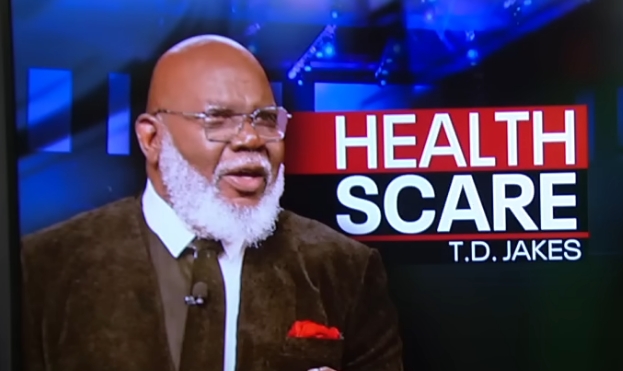Bishop T.D. Jakes’ recent health scare during a sermon at The Potter’s House in Dallas, Texas, offers an important moment for reflection on the challenges of spiritual leadership, the balance of personal well-being, and the responsibilities of faith-based accountability. The incident, while deeply concerning, has ignited discussions around the immense pressures of ministry and the expectations placed upon leaders in high-profile religious roles.
A moment of shared humanity
During the service, Jakes appeared to struggle with his health, alarming congregants and sparking immediate action to ensure his safety. His daughter, Sarah Jakes Roberts, later reassured the public that the bishop was stable and under medical care. Her heartfelt gratitude for the outpouring of prayers and support underscored the collective concern of the faith community.
“This could have been a tragic day, but by the mercy and grace of God, it wasn’t,” Roberts said.
The health incident also brought to light a spectrum of reactions. While many flooded social media with well-wishes, others criticized Jakes’ ministry, questioning his associations, lifestyle, and adherence to the principles of Christian leadership. These divergent views reflect the complexities of public ministry, where leaders are both celebrated and scrutinized.
The demands of ministry
For leaders like Jakes, whose influence spans millions, the demands of ministry are profound. The balancing act of spiritual guidance, administrative leadership, public appearances, and personal obligations can lead to exhaustion. The physical, emotional, and spiritual toll of such responsibilities often remains unseen by the public.
The Bible illustrates the importance of rest and renewal. Even Jesus, amid his ministry, withdrew to pray and recuperate (Luke 5:16). This principle highlights the necessity for leaders to prioritize self-care—not as a luxury but as a stewardship of the body, mind, and spirit entrusted to them by God.
As a minister, I’ve observed that leaders often feel compelled to bear every burden. However, delegation, rest, and self-care are not signs of weakness but wisdom. Neglecting these practices can lead to burnout, jeopardizing a leader’s ability to serve effectively.
Self-care as stewardship
Jakes’ health scare is a sobering reminder of the need for self-care within ministry. As 1 Corinthians 6:19-20 states, our bodies are temples of the Holy Spirit, and we are called to honor God by caring for them. Self-care enables leaders to lead with clarity, purpose, and vitality.
This principle extends beyond the individual to the faith community. Churches must actively support their leaders, ensuring they have the resources and encouragement to maintain a healthy work-life balance. Congregants must also resist the temptation to place their leaders on unrealistic pedestals, recognizing their humanity and vulnerabilities.
Accountability and transparency
The incident also shines a light on the importance of accountability and transparency in ministry. Public leaders, especially in faith communities, are called to uphold values of integrity and humility. Proverbs 27:17 reminds us that accountability sharpens and strengthens leadership, fostering trust within the congregation and the broader community.
Transparency about challenges—whether related to health, finances, or ministry decisions—helps build a culture of openness and integrity. Surrounding oneself with trusted advisors and peers who provide honest counsel is vital for maintaining accountability.
Lessons for the church
Bishop Jakes’ health scare offers several lessons for the church and its leaders:
- Pray for our leaders: The role of a minister is spiritually and emotionally demanding. Upholding them in prayer is an act of love and unity.
- Encourage self-care and balance: Churches must promote a culture where rest and health are valued as essential to effective ministry.
- Advocate for accountability and transparency: Integrity should be the foundation of all aspects of church leadership, from spiritual teaching to financial stewardship.
As St. Paul reminds us in 1 Corinthians 10:31, “So whether you eat or drink or whatever you do, do it all for the glory of God.” This moment is an opportunity for the church to reflect on how it supports its leaders and ensures that ministry is sustainable, accountable, and aligned with the teachings of Christ.
Moving forward
Bishop T.D. Jakes’ health scare is a poignant reminder of the shared humanity between leaders and their congregants. It is a call to approach ministry with compassion, humility, and a renewed commitment to holistic care. By fostering a culture of prayer, self-care, and accountability, we can ensure that those called to lead are equipped to do so faithfully and effectively, glorifying God in all they do.

